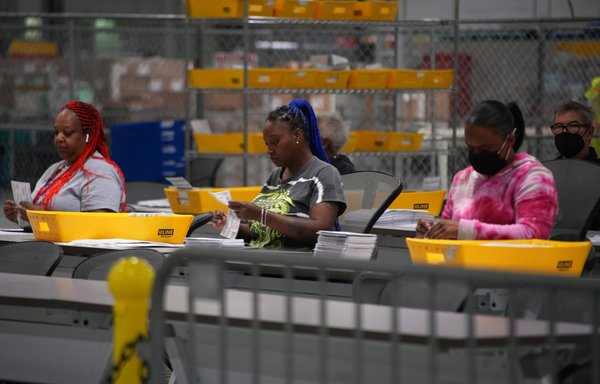As the 2020 presidential election hung in the balance, the national spotlight shined on the Pennsylvania Convention Center, where the Board of Elections was overseeing the counting of a record number of mail-in ballots in Philadelphia.
It was a grueling four days — punctuated by competing demonstrations outside the building — before enough results had been tallied for the Associated Press to finally project Joe Biden was the state's winner over Donald Trump at 11:25 a.m. on Saturday, Nov. 7.
MORE: It's not hype that Pennsylvania could decide the 2024 presidential election. It's math.
Four years later, there are reasons to be cautiously optimistic that there won't be another dayslong wait to find out who will earn the critical swing state's coveted 19 electoral votes.
What took so long in 2020?
There were a number of factors that played rolls in the delayed results in 2020, including the influx of mail-in ballots during the COVID-19 pandemic, scrutiny surrounding the election and the narrow margin of victory, said Omar Sabir, the chairman of the Philadelphia City Commissioners who also was on the board four years ago. The city commissioners are a three-person board in charge of conducting elections in the city, everything from setting policies for voter registrations to overseeing the counting of votes.
Pennsylvania is one of only seven states that can't begin processing mail-in ballots until the morning of Election Day.
"That means county election officials cannot even remove the ballots from the envelopes and prepare them to be scanned until that time – on a day when those same officials are also running more than 9,000 polling places across the state," the Pennsylvania Department of State said in a statement. "Then, under the Election Code, counties may not even begin to record and publish mail ballot results until after the polls close at 8 p.m. Election Day."
Counting mail-in ballots is a more arduous process than tallying in-person votes, involving a combination of trained workers and special machinery to open, sort, review and scan. And the double envelop each ballot comes in, a security measure, doesn't speed up the process, either.
"The Department of State has never had final results on Election Night, regardless of whether media outlets project a winner on that night or a later date," the agency said.
What's different for the 2024 election?
While the state law restricting early counting of mail-in ballots is still in place, election officials expect much more people to vote in person this time around.
Sabir said about 70% of Philadelphian voters typically choose to go to the polls versus mailing in their ballots, but in 2020 it was closer to a 50/50 split. This year, he's expecting around 200,000 mail-in ballots compared to the 374,000 received four years ago.
MORE: In Pa.'s U.S. Senate race, Bob Casey seeks fourth term against Republican challenger Dave McCormick
"The fact that there were so many people that were voting by mail, we sort of depended on the mail results," Sabir said. "But in 2024, there's less of a demand for people voting by mail, so we'll likely see the election results be faster this time.
"But then again, if ... it's a close race, we might have to do a recount, we may have to get into the provisionals, and we'll know all that as it gets closer to the election."
Biden's narrow victory — having won the state by a 1.17% margin — meant media organizations were hesitant to make a call with the large number of outstanding mail-in votes. And according to polls, it's going to be another close race, with Trump and Vice President Kamala Harris nearly deadlocked. But 2016 proved that slim margins don't have to mean delayed results: Trump defeated Hillary Clinton by just 0.73%, and the AP called that race at 1:35 a.m. after Election Day.
Another change since the last presidential election was the state's passage of Act 88 to establish the Election Integrity Grant program.
"Many counties have used their Act 88 money to purchase equipment to help process and sort mail ballots or to hire additional election workers to handle mail ballots," the Department of State said.
Sabir said Philly has made technological upgrades with fast-paced scanners and officials visited other election boards across the country where mail-in voting has historically been more popular, like Colorado, to learn about security, public relations, and recruiting and training poll workers.
While Pennsylvania election officials are still preparing for delays — and the conspiracy theories, protests and violence that could accompany them — there are positive signs there won't be another four-day wait for this election's results.
"By midnight on election night, the overwhelming, vast majority of these votes will be counted," Sabir said.

